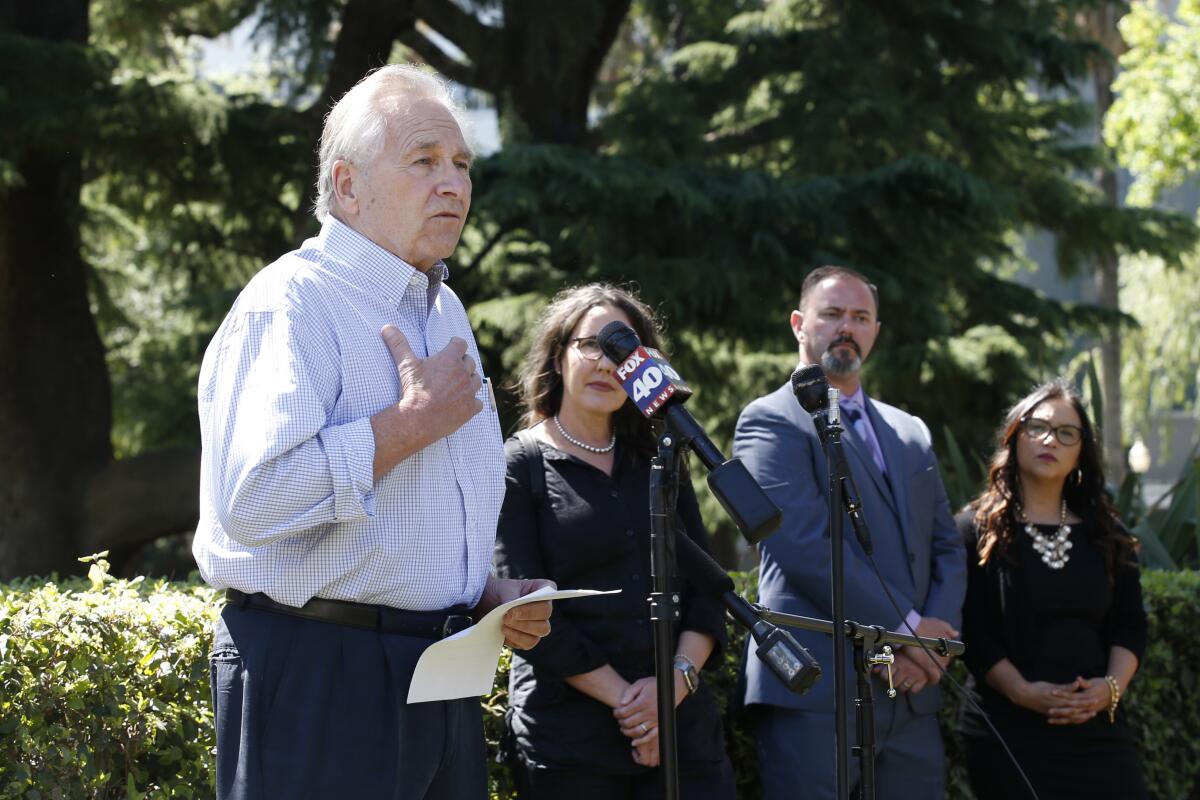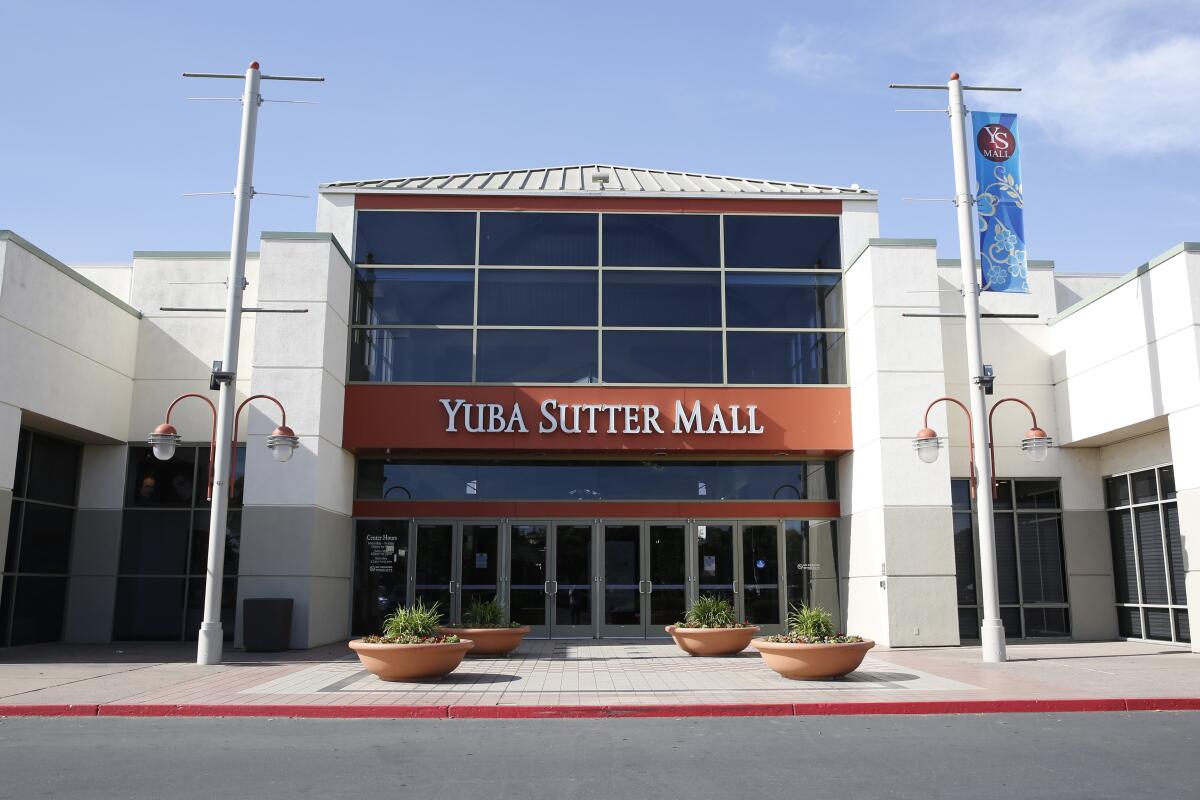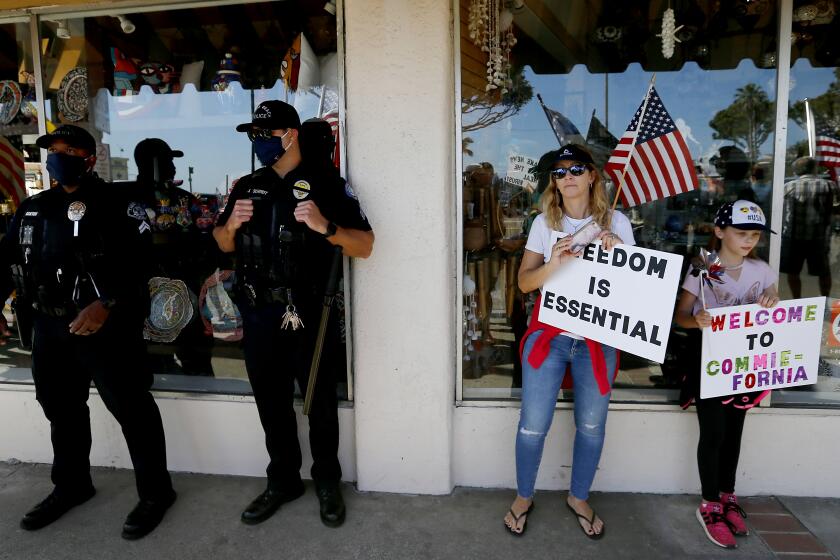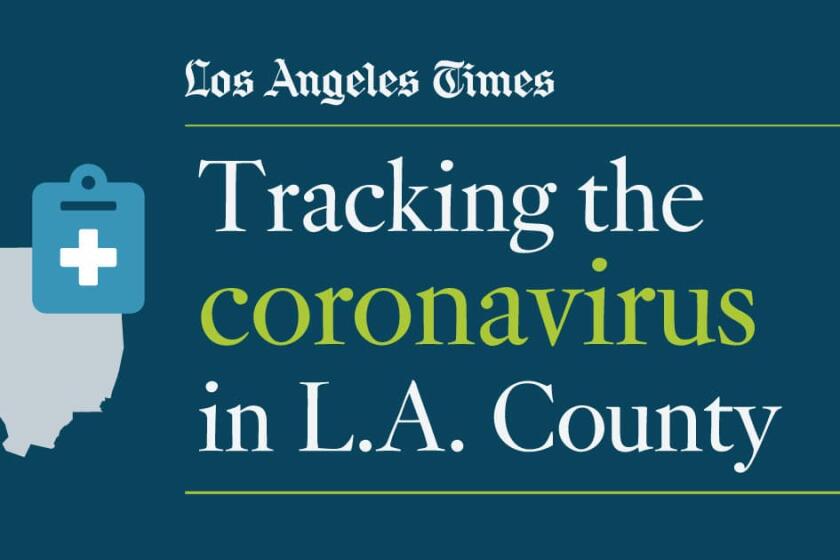Column: Rural areas have a message for Newsom: One size doesn’t fit all in reopening California

- Share via
SACRAMENTO — Rebellion is infectious. Rural people are in revolt against Gov. Gavin Newsom’s statewide virus-fighting rules, which make little sense in burgs such as Bieber.
Bieber has hardly anything in common with the likes of Burbank or Balboa.
“There’s a bar, a restaurant, a hardware store, market, post office, school and a gas station with one pump,” says Republican state Sen. Brian Dahle of Bieber in Lassen County. “No stoplight.”
Dahle grows cereal grains and represents 11 mostly mountain counties in the Senate. His wife, Megan Dahle, is a Republican assemblywoman.
In four of the senator’s counties — Modoc, Lassen, Sierra and Alpine — there hasn’t been one case of coronavirus, he says. Zero.
“There is no curve. It’s flat.”
“People are getting fed up” with the governor’s stay-at-home, business-shut-down orders, Dahle says. “They want to open up, get back to normal.
“We’re not like Los Angeles or San Francisco. Let’s get back to cooler heads. Let the people free.”
Modoc, on the Oregon border six miles north of Dahle’s farm, with a population of only 9,570, didn’t wait for the governor to set it free. The county reopened itself Friday.
“Our businesses are dying, and people need to be able to feed their children and pay their rent,” said Heather Hadwick, a Modoc County emergency services official.
From the high desert to the beach enclaves of Orange County, a growing number of California businesses deemed nonessential are choosing to reopen in defiance of orders from local and state authorities.
Good for Modoc. Its “big city” is Alturas, the county seat, with a population of 2,826. Alturas hardly equates with Alhambra or Anaheim in virus risk.
Neither is Coloma anything like Carson or Covina.
Coloma is where gold was discovered in 1848, along the American River in the Sierra foothills east of Sacramento. The find set off the ’49ers’ rush to California in search of riches that mostly never panned out. But we were admitted to statehood the next year.
There’s a state park at the Coloma gold discovery site in El Dorado County. Newsom ordered it and several state recreation areas along historic Highway 49 closed to slow the virus spread.
But it’s spring. Wildflowers are blooming, trout are biting and the weather has been spectacular. Inevitably, people have been ignoring the governor and enjoying the public parks — educating themselves on the gold discovery, hiking, fishing and basking in the Motherlode majesty.
Problem is, Newsom also closed the parking lots — as he did at the coastal beaches. With no public lots open, motorists park on streets — and clog beach community neighborhoods.
Closing parking lots inconveniences motorists, but it doesn’t deter every recreation seeker. Definitely not along Highway 49.
“The governor said it’s OK for people to go out and exercise for their physical and mental health, so people are doing that,” says El Dorado County Sheriff John D’Agostini.
“But the parks are closed and people can’t get into the lots. So they’re parking on the two-lane road. With a lot of traffic, somebody is going to get hit.”
The latest maps and charts on the spread of COVID-19 in Los Angeles County, including cases, deaths, closures and restrictions.
D’Agostini asked the state parks department to reopen the lots and parks.
“They don’t have to open all the concessions,” he says. “Just get people off the roadway.
“But they are absolutely refusing to do that. They’re not willing to budge and work with us. They say they can’t violate the governor’s orders.”
“The governor is dragging his feet,” the sheriff adds. “I’m monitoring it. If things look like they’re going to get out of control and threaten public safety, I’m considering cutting the locks and opening the gates myself.”
El Dorado County — population 193,000, including South Lake Tahoe — is letting its stay-at-home directive expire and has asked Newsom to loosen restrictions on business. The county has been lightly touched by the virus, with no deaths.
Politically, these northern mountain and valley farm counties are California outliers. They’re largely Republican.
Bakersfield Republican Shannon Grove is the Senate minority leader. She keeps stressing that north of the Tehachapi, the virus hasn’t been as vicious as in densely populated Southern California.
“The governor should realize that L.A. County is different than Kern County,” Grove says. “We need to open up county by county. We’ve had only a handful of deaths. Our hospitals are empty. We definitely have to reopen the economy.”
Both parties are trying to keep partisan politics out of the virus fight. They’re following the lead of recent uncharacteristically cordial relations between Newsom and President Trump.
Nevertheless, northern farmers and mountain people have always fought against being looped in with and overpowered by Southern California, eyeing Angelenos suspiciously as water grabbers.
Now they’re trying to escape Newsom’s stay-at-home orders that they protest are too heavy-handed for sparsely populated areas.

Yuba and Sutter counties in the Sacramento Valley plan to reopen businesses this week. They and four other nearby counties — Butte, Glenn, Tehama and Colusa — have asked Newsom to exempt them from his stay-home order.
“Local businesses can’t survive week after week with no business,” state Sen. Jim Nielsen (R-Tehama) says. “After a while they throw up their hands and quit, and there go the jobs.
“Given the low infection rates, we have to open up our local economy. It’s always struggling anyway.”
Assemblyman James Gallagher (R-Yuba City), a rice farmer, says: “We’re not saying all of California is ready to open, but we are. We’ve met the [governor’s] criteria. The dynamics have changed a lot. This doesn’t make sense anymore.”
Newsom keeps hinting at loosening his reins. He shouldn’t dawdle. Rural folks are beginning to cut the reins themselves and head in another direction.
Coronavirus could kill 100,000, Trump says, weeks after predicting lower toll
More to Read
Sign up for Essential California
The most important California stories and recommendations in your inbox every morning.
You may occasionally receive promotional content from the Los Angeles Times.














